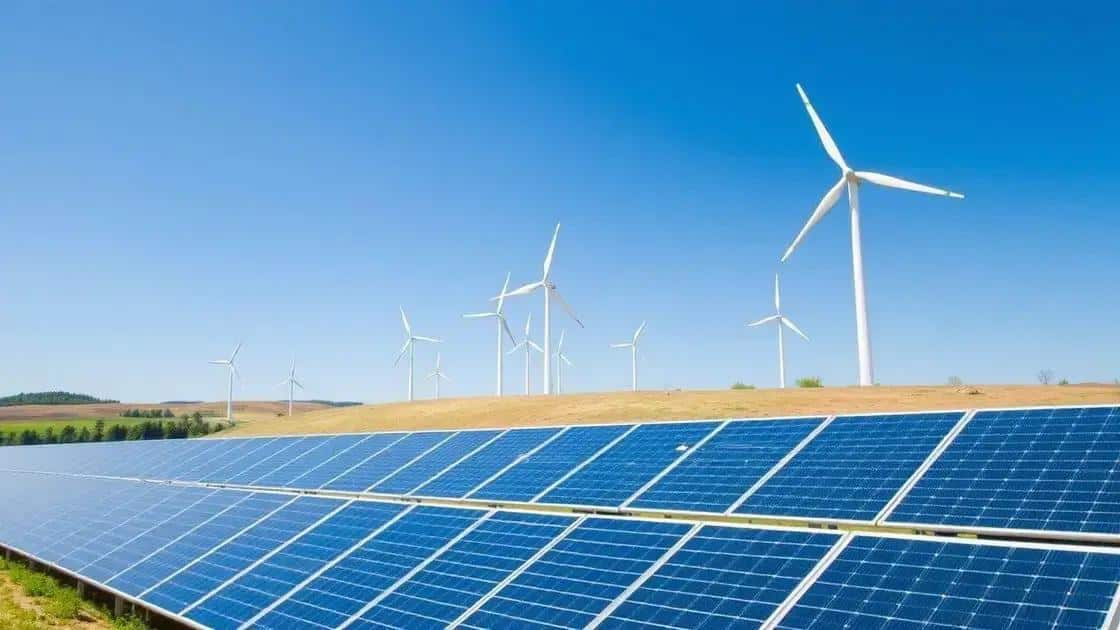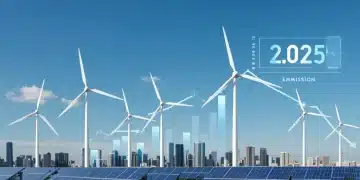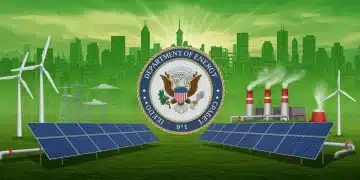Insights on renewable energy expansion: benefits for everyone

Renewable energy expansion is driven by advancements in technology, global cooperation, and supportive policies, helping to create a sustainable future while addressing challenges such as infrastructure limitations and public acceptance.
Insights on renewable energy expansion show how this shift impacts our lives and the environment. Have you ever wondered how embracing renewables can create a cleaner future? Let’s explore the possibilities together.
Understanding the importance of renewable energy
Understanding the importance of renewable energy is crucial in today’s world. It plays a key role in addressing climate change and reducing our carbon footprint. Through the use of sources such as solar, wind, and hydro, we can produce energy that limits pollution and conserves natural resources.
Benefits of Renewable Energy
There are many advantages to investing in renewable energy. This shift not only helps the environment but also enhances energy security and diversifies our energy sources. Here are some notable benefits:
- Environmental impact: Reduces greenhouse gas emissions.
- Job creation: Generates opportunities in the green economy.
- Energy independence: Decreases reliance on imported fuels.
- Long-term savings: Lowers energy costs over time.
As we explore these benefits, it’s clear that transitioning to renewable sources holds the potential to create a sustainable future. For instance, solar panels can be installed on rooftops, allowing homes to generate their own electricity. By harnessing the power of the sun, households can become less dependent on traditional energy grids.
Wind energy is another powerful example of renewable energy in action. Wind farms can be established in many areas, producing significant amounts of electricity. As technology advances, wind turbines grow more efficient, making it easier to harness this abundant resource.
Investing in Renewable Technologies
Investing in renewable technologies is essential for future growth. Governments and private sectors are increasingly working together to fund research and innovation. This collaboration can lead to breakthroughs that improve energy efficiency and lower production costs.
Furthermore, communities that embrace renewable energy often experience an economic boost. By attracting clean energy companies, these areas see increased investments and job opportunities. As a result, the local economy can flourish while contributing to global sustainability goals.
Understanding the importance of renewable energy is not just about addressing climate change; it’s about ensuring a more resilient and sustainable future for everyone. Embracing renewable sources can lead to healthier communities, a stronger economy, and a cleaner planet.
Current trends in renewable energy expansion

Current trends in renewable energy expansion show a significant shift towards cleaner energy sources. As technology advances and awareness grows, many countries are implementing innovative strategies to enhance their energy landscapes. This transformation includes the integration of renewables into their primary energy matrices.
Growing Installation of Solar Energy
One of the most noticeable trends is the rapid installation of solar energy systems. More homeowners and businesses are opting for solar panels, which allows them to produce their own energy. In fact, the price of solar technology continues to drop, making it more accessible to everyone.
- Expansion of community solar projects: These allow multiple users to benefit from a single solar array.
- Increased efficiency standards: Improved technology is making solar panels more effective.
- Incentives for solar adoption: Many governments offer tax credits to encourage installations.
Besides solar, the trend for wind energy is also expanding. Wind farms are being built in both onshore and offshore locations, harnessing the power of the wind to generate large amounts of electricity. The advancements in turbine technology have contributed to this expansion, making wind energy a viable option in diverse climates and regions.
Another significant trend is the focus on energy storage solutions. As renewable energy sources like solar and wind are variable, the ability to store energy has become crucial. Technologies such as batteries and pumped hydro storage are now being developed to ensure that energy is available even when production is low. This increases the reliability and efficiency of using renewables as a primary energy source.
Policy and Regulatory Changes
Government policies are also adapting to support this renewable energy expansion. Many countries are setting ambitious targets for renewable energy adoption. These policies encourage investment and innovation, helping to stimulate growth in the sector. For example, renewable energy mandates set specific quotas for how much energy must come from renewable sources.
Additionally, international agreements aim to reduce greenhouse gas emissions. These agreements push countries to integrate more renewable energy solutions into their grids. As a result, the collaboration between nations is fostering advancements that benefit the entire planet.
With these evolving trends, the landscape of energy generation is changing rapidly. Investing in these renewable technologies not only mitigates climate change but also promotes sustainable economic growth. Society is moving towards an energy future that is cleaner, more efficient, and increasingly reliant on renewables.
Challenges faced in implementing renewable energy
Many challenges faced in implementing renewable energy solutions can slow down the transition to a sustainable future. Understanding these obstacles is crucial for developing effective strategies. While the benefits of renewable sources are clear, several factors can hinder their adoption.
Infrastructure Limitations
One of the most significant challenges is the lack of appropriate infrastructure. Many regions lack the necessary facilities to support renewable energy technologies. For instance, building new transmission lines is essential for connecting remote wind and solar farms to cities. This can be a lengthy and costly process.
- Old energy grids: Many existing grids are not equipped to handle renewable energy efficiently.
- Investment needs: Upgrading infrastructure requires significant financial resources.
- Geographical challenges: Renewable resources are often located far from where the energy is needed.
In addition to infrastructure issues, regulatory barriers also pose significant challenges. Policies and regulations may lag behind technology, creating confusion and slowing progress. Policymakers must work to develop supportive frameworks that encourage renewable energy projects.
Public Perception and Acceptance
Another challenge is public perception. Many people are unaware of the benefits of renewable energy or have misconceptions about its reliability. For example, some may believe that it cannot provide consistent energy supply. Educating the public about the advantages and capabilities of renewable sources is essential.
Additionally, local opposition to renewable projects, often referred to as “Not in My Backyard” (NIMBY), can hinder implementation. Communities may resist wind farms or solar installations due to concerns about aesthetics, noise, or land use. Addressing these concerns through community engagement and outreach can help facilitate acceptance.
Financial Considerations
Financial challenges also play a crucial role. Investing in renewable energy technologies often requires substantial upfront costs. While long-term savings are achievable, many potential investors are hesitant due to initial expenses. Financial incentives, such as tax credits or subsidies, can encourage adoption.
Moreover, the volatility of energy markets can impact investments. Fluctuating prices for traditional energy sources may lead investors to question the stability of renewable investments. To mitigate this issue, consistent policy support and market mechanisms are necessary to foster confidence.
Despite these challenges, the momentum towards renewable energy continues to grow. By addressing these issues, stakeholders can enhance the effectiveness of policies and initiatives aimed at supporting the adoption of clean energy solutions.
Future outlook for renewable energy initiatives

The future outlook for renewable energy initiatives is optimistic as technology continues to evolve and public awareness increases. With government policies increasingly supportive of clean energy, the momentum is building for a significant shift in how we generate and consume energy.
Innovative Technologies
Advancements in technology are playing a crucial role in shaping the future of renewable energy. For instance, the development of more efficient solar panels and wind turbines is making these sources of energy more accessible and cost-effective. Better energy storage solutions, such as advanced batteries, allow us to store excess energy for later use, ensuring a more reliable supply.
- Emerging technologies: Innovations like floating solar farms and enhanced geothermal systems are gaining attention.
- Smart grids: Integration of smart technology in electrical grids enhances efficiency and reliability.
- Decentralized energy systems: Small-scale, local energy production is becoming more popular.
As these technologies improve, they lead to reduced costs for consumers and increased adoption rates of renewable solutions. The market for renewable energy is expected to expand, creating new job opportunities and innovative business models.
Global Cooperation and Commitment
Future success in renewable energy initiatives will also depend on global cooperation. Countries are recognizing the importance of coming together to share knowledge and resources in the fight against climate change. Collaborative efforts, such as international agreements and research partnerships, will help accelerate progress.
Public and private sectors are increasingly investing in renewable projects, which empowers local communities and creates sustainable growth. This collaborative spirit not only benefits individual nations but also leads to a more coordinated approach globally, fostering resilience against environmental issues.
Legislative Support and Financial Incentives
Supportive policies and financial incentives are set to play a fundamental role in propelling renewable initiatives forward. Governments are committing to ambitious clean energy goals, setting specific targets for renewables in their energy mixes. These mandates can drive investments and encourage innovation.
Tax credits, subsidies, and grants for renewable energy projects provide the necessary encouragement for businesses and individuals to invest in clean energy solutions. With such support, we can expect a surge in renewable energy adoption, reflecting a broader societal commitment to sustainability.
As we look ahead, the potential for renewable energy initiatives is enormous. By embracing innovation, fostering cooperation, and supporting legislative measures, we can pave the way for a sustainable and thriving energy future.
The transition to renewable energy is not just a necessity; it’s an opportunity for a greener, healthier future. By overcoming challenges and embracing innovative technologies, we can create a sustainable energy landscape. Global cooperation, supportive legislation, and public acceptance will drive the growth of this important sector. Together, we can ensure that renewable energy becomes the cornerstone of our future, contributing to a cleaner planet and a thriving economy.
FAQ – Frequently Asked Questions about Renewable Energy
What are the main types of renewable energy?
The main types of renewable energy include solar, wind, hydroelectric, geothermal, and biomass.
How does renewable energy impact the environment?
Renewable energy reduces greenhouse gas emissions, decreases air pollution, and preserves natural resources, promoting a cleaner environment.
What are some challenges in adopting renewable energy?
Challenges include infrastructure limitations, regulatory barriers, public acceptance, and financial considerations.
How can individuals support renewable energy initiatives?
Individuals can support renewable energy by using energy-efficient appliances, advocating for clean energy policies, and investing in renewable technologies, such as solar panels.





